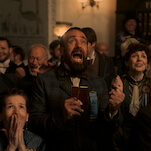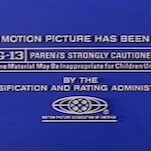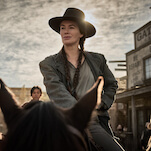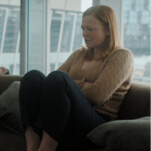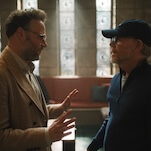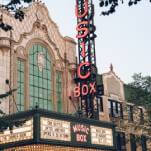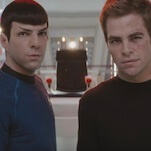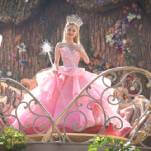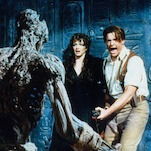People have complained about the ridiculousness of even making a 1994 nostalgia movie in 2008. But I think it's worth noting that American Graffiti, the gold standard of pop-culture nostalgia, looked back wistfully back at 1962 in 1973, a mere eleven years later. American Graffiti's tagline famously asked "Where were you in '62?" If a film were to ask "Where were you in 1997?" it would undoubtedly be laughed out of theaters.
Yet I do feel enormous nostalgia for 1997. That's the year I started writing for the A.V Club, us A.V Clubbers (all three of us) shared an office with the comedy writers in the popcorn district of Madison and the world seemed an infinitely brighter, more hopeful place, what with years of Clintonian peace and prosperity (though I was a Nader-voting Clinton hater at the time, history has been kind to him) and the new economy pointed to a world limited only by the boundaries of our imagination.
That's part of the reason why I was so disappointed in August. The New Economy is enormously fertile, more or less virgin ground for filmmakers. Yet other than Startup.com I can't think of another halfway decent, let alone great, movie about the dot.com boom. Why?
Why did American Graffiti resonate so strongly with audiences despite surveying the relatively recent past? What happened between 1962 and 1973 that made taking a trip inside the Wayback Machine so irresistible? In a nutshell, the sixties happened: Vietnam and The Beatles and acid and rock star overdoses and MLK getting gunned down and Watts and the Kennedy assassinations. As Rick Perlstein indelibly documents in his awesome new book Nixonland, the relative cultural consensus of the early sixties gave way to a fractured landscape that exploded into a million little warring factions.
This development is captured in the titles of Perlstein's books: Before the Storm: Barry Goldwater and the Unmaking of the American Consensus and Nixonland: The Rise Of a President and the Fracturing of America. I look forward to the hot young historian's next two books: Ronald Reagan And The Breakening of American Unity and George W. Bush: Just an Awful Fucking President Who Tore America Apart With His Shitty Presidenting.
For American Graffiti audiences, the film marked a return to a more innocent era, when all good, decent Americans had to fear was catching a chain to the face from The Gorch. It's the same for The Wackness. Much of the film's appeal stems from returning to a world before 9/11, George W. Bush, the Iraq War and the Disneyfication of Times Square, the deaths of Notorious B.I.G and 2Pac, and that creepy thrice-divorced mayor guy who looks like Dracula making the streets unsafe for scumbags, drug dealers and sick fucks. Well, that and the glittering promise of hot Kingsley-on-Olsen action.
Nostalgia simplifies and distorts. It transforms tricky, complicated times to fuzzy, idealized memories. The world undoubtedly changed much more drastically between 1962 and 1973 than it did between 1994 and 2008, which may be why a nineties nostalgia film seems like such a strange proposition. Incidentally, I haven't seen The Wackness yet but I swear by the blogger's code of being strongly opinionated yet utterly uninformed. Of course, American Graffiti is also a great fucking movie that takes place in the recent past whereas August and The Wackness seem to exist solely for the sake of nostalgia. Take away their period setting and all you're left with is a misfiring indie drama and what I hear is a weak coming-of-age mediocrity.
Here's my question for you, dear reader. How do you think the ever-increasing speed of life and constant technological innovations affect the way we process the past? Does having the music and movies of the past at our collective fingertips via Youtube and Amazon and Netflix make a wistful trip back to the bygone days of 1994 more or less appealing?
